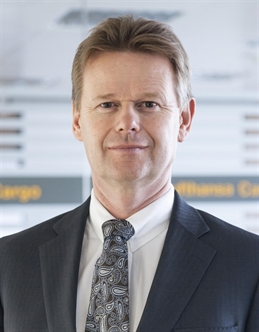
Lufthansa Cargo is considering the possibility of switching over to the sort of all-inclusive rates structure announced by several other major airlines – notably Emirates, Qatar Airways and IAG – over the last few months.
However, contrary to another air transport industry trend over the last few years which has seen many scheduled carriers pull out of all-cargo operations or substantially reduce them to focus primarily on their bellyhold capacity, the German carrier remains committed to freighter operations, having recently added a fifth B777F to a fleet which also currently includes 14 operational MD11Fs.
Those were two of many issues discussed during Lufthansa Cargo’s annual press conference at its home hub in Frankfurt last month (March 19) – an event held primarily to review the organization’s 2014 business year, which saw a near 27% increase in operating profit compared with 2013 to €100 million (US$108 million), and assess prospects for 2015 for which it currently expects to see a “further improvement” in that figure.
On the subject of introducing all-inclusive cargo rates incorporating previously separately-billed surcharges, Peter Gerber, the organization’s executive board chairman and CEO, said Lufthansa Cargo was currently “taking a very close look” at that subject “but at the moment we have not reached a conclusion about the right way forward.”
Commenting on other anticipated future general air cargo traffic trends, he said recent figures from global industry analyst Seabury suggested that in the case of traffic to/from Europe, Asia Pacific would continue to be the strongest trade lane, with projected average annual growth of 4% in the period 2014-20, well ahead of the just over 1% figure for Europe/North America. Projected overall annual global growth in that period, he added, was 3-4%.
Lufthansa Cargo’s view, continued Gerber, was that freighters would “continue to play a vital role” on major inter-continental trade lanes, particularly Europe/Asia Pacific. To support that argument, he quoted figures from other industry sources suggesting the share of cargo traffic carried on freighters in that market would actually increase from a current 72% to 75% in 2025, with the share moved in passenger aircraft bellyholds dropping from 28% to 25%.
Elsewhere in the world, he reported, the freighter share of traffic in the North America/Asia Pacific market was projected to decline marginally over that period, from 80% to 78%, while the North America/Europe sector was set to see the freighter share drop from 43% to 30%.
Other points discussed at the press briefing included an update on Lufthansa Cargo’s current implementation of a new IT system for freight handling, which was reported to be set to get its final rollout in Frankfurt at the end of April, and longstanding plans to develop a new air freight logistics centre, LCCneo, at that hub.
On the subject of the new hub, Gerber reported that although some preparatory ground work has already been started, the organization’s supervisory board had yet to formally approve the investment and he warned that continuing repeated strikes by the airline’s pilots were “not going to make it any easier” to secure approval for that investment.
By Phil Hastings
Europe Correspondent | London



